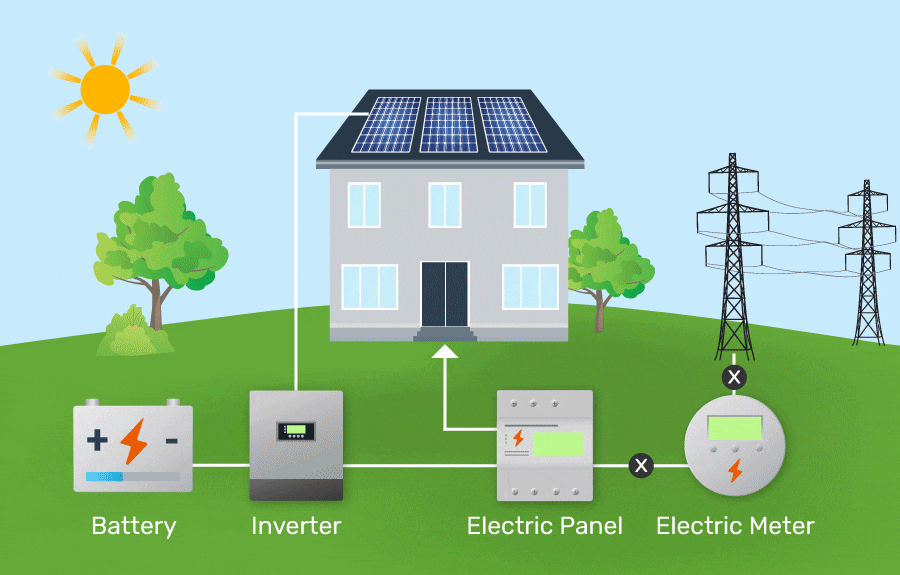In today’s era of pursuing clean energy, solar cells have become the leader in leading the revolution. This article will delve into the solar battery cost. Read on as explore the key questions about how do solar batteries work, solar battery cost, and whether they are worth investing in.

How do Solar Batteries Work?
The function of the solar battery energy storage system is to convert solar energy into electrical energy and store it to provide power at night or on cloudy days when direct solar energy cannot be generated. Solar panels convert sunlight into direct current through the photovoltaic effect during the day, and the generated electrical energy that is not immediately utilized is directed to solar cells. After the sun sets and the panels are no longer producing electricity, the house draws power from the batteries.

How Much Do Solar Battery Cost?
According to the U.S. Office of Energy Efficiency and Renewable Energy, you can expect to pay approximately $25,000 to $35,000, depending on a variety of factors, including the size of the solar system and batteries and your location. At the same time, it’s often more affordable and convenient to install solar panels and batteries. If you decide to purchase storage after the solar panels are installed, the cost for the batteries alone will be roughly between $12,000 and $22,000.
In terms of performance, lithium-ion batteries are considered the best choice for household applications that require daily charging and discharging. The latest lithium-ion batteries have a lifespan of more than 4,000 cycles, which means more than 10 years of use on a daily charge. Lithium-ion battery prices vary based on brand and storage capacity, but most homeowners can expect to pay only about $10,000 to $15,000 for a battery system (not including solar panels).
As of August 2022, solar cells are eligible for a 30% federal tax credit through the Inflation Reduction Act. You can claim this deduction on your federal income taxes in the year you purchase your solar system. For example, if you buy $10,000 worth of product, you can get a $3,000 tax deduction.
The table below outlines the main characteristics and average costs of four common types of solar cells.
| Solar Battery Type | Size | Power | Cost Range |
| Lead-acid | Similar to car batteries | 100-250 watts per battery; can combine multiple units as needed | Less than $250 per kWh |
| Lithium-ion | Varies by manufacturer and battery model; the Tesla Powerwall 2 is 45.3 inches high by 29.6 inches wide, and the Enphase IQ 10 is 42.1 inches high by 26.1 inches wide | Ranges from 3 to 20 kW | Over $800 per kWh; can achieve lower prices in large-scale applications |
| Nickel-cadmium | Similar to car batteries | 100-250 watts per battery; can combine multiple units as needed | Less than $400 per kWh |
| Redox flow | Very large; each unit can be the size of a shipping container | Typically 100 kW or larger; can reach megawatts(1 megawatt – 1000kW) | Less than $350 per kWh in large-scale applications |
Are Solar Batteries Worth It?
Batteries are expensive, and even though they’re becoming more common now, that doesn’t mean they’re the right choice for everyone, and whether a battery is worth it still depends on what you want it to be used for. If you find that any of the following apply to you, then adding batteries to your solar installation may make sense.
- You experience frequent power outages: If you live somewhere with frequent power outages, especially in flood-prone areas, batteries are definitely worth considering. Solar cells can provide backup power during power outages, increasing your resiliency and ensuring critical equipment continues to be powered.
- You want to save money on your electricity bill: If electricity costs are high in your area, taking advantage of solar power stored during the day may lead to long-term savings.
- You can get great incentives: Check out local incentives, rebates or tax credits for solar and energy storage. In some areas, you can often get discounts on batteries, which can help you significantly reduce the upfront cost of installing solar cells.
How Much Do Solar Battery Cost in Your State?
The price of batteries is not consistent in each state. In some states, installers may charge higher labor fees because they are not familiar with batteries, or they may sell more expensive battery brands, thus driving up battery prices.
You can see the average solar battery cost in your state by downloading the table below:
Factors Affecting Solar Battery Cost
Battery Quality
Although energy storage products must meet strict safety testing requirements, their quality still varies depending on the chemical composition of the batteries. Most household batteries are lithium-ion batteries, and the two most common lithium-ion batteries on the market are nickel manganese cobalt (NMC) and lithium iron phosphate (LFP). LFP batteries are more efficient, last longer and are safer. Typically, LFP batteries are typically 30-50% more expensive than NMC batteries.
Battery Capacity
Larger batteries can store more usable power and cost more. But if you don’t have big capacity needs, your solar battery cost will be less.
Battery Type
Common batteries include lithium-ion batteries, lead-acid batteries and flow batteries. Typically, lithium-ion batteries are more expensive but remain popular due to their high efficiency and long life.
Inverter Cost
Some solar battery energy storage systems may require an inverter to convert the DC power stored in the batteries into AC power. If your system doesn’t come with one, you’ll need to purchase it separately, at which point the cost of the inverter adds to the overall battery system expense.
Brand and Manufacturer
When choosing a battery, the battery brand and manufacturer are also an important factor affecting the battery price. Different brands offer batteries at different prices, usually well-known and reputable brands cost more, but they may offer better performance and warranty.
Labor Cost
Installing batteries and solar panels at the same time generally costs less than adding batteries to a solar system later on. The latter would require a permit resubmission, as well as some additional electrical work to connect the batteries to the solar panels.
Local Market
The cost of battery systems also depends on local market demand and supply conditions. If there is high local demand for solar products, suppliers may adjust their prices to meet market demand. Typically, a highly competitive market prompts suppliers to lower prices to gain market share.
Conclusion
In this article, we take a closer look at how solar cells work, how much they cost, whether they’re worth buying, and what factors influence them. By reducing reliance on traditional electricity, it not only saves households energy bills but also helps reduce environmental impact.Also, adding an energy-efficient toilet to your home can further enhance these benefits, conserving water and lowering utility costs while supporting a more sustainable lifestyle.
Thank you for reading this article, if you are considering purchasing a solar battery energy storage system, please feel free to contact GYCX Solar, GYCX Solar provides you with professional consultation and customized solutions. We look forward to providing you with greener and cleaner energy solutions.

FAQ
How long do solar batteries last?
The average life of a solar cell is between 5 and 15 years, and typically solar cells have a 10-year warranty. After the warranty expires, the battery may continue to operate for another 5 years.
How long can a solar battery run my appliances?
The battery’s power supply time mainly depends on the battery’s capacity and the equipment it powers. The average solar cell capacity is about 10 kWh. An average-sized household battery can power critical appliances such as refrigerators, WiFi routers, lights, and sockets for about 8 hours without recharging. If you run a power-hungry appliance like an air conditioner, your battery will drain quickly.
What appliances can a solar battery power?
The rated power output of a battery is measured in kilowatts (kW). Most solar cells have an output of at least 5 kW, so they can power refrigerators, WiFi routers, lights, sockets and device chargers, and even electric stoves. If you want to run a power-hungry appliance like an air conditioner, you may need to install multiple batteries to achieve the required power output.
Can I install a battery without solar panels?
Yes, it’s called a stand-alone battery system that charges primarily by purchasing electricity, rather than relying on power generated by solar panels. It is generally used in scenarios where the backup power supply is active in the open air and in field workstations.

I am interested.